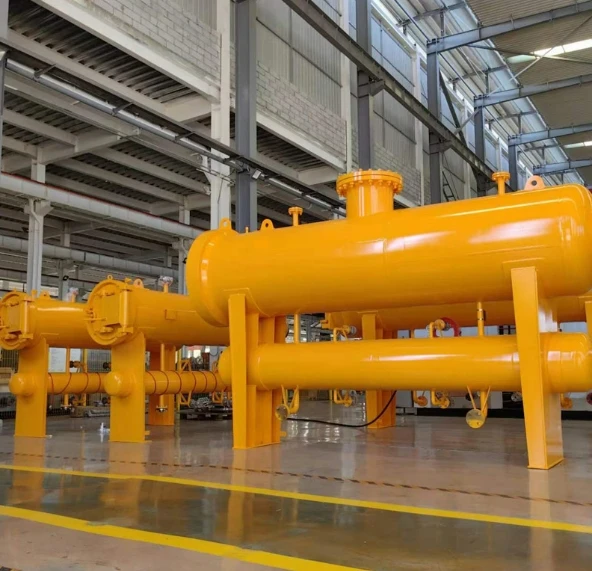
Nov . 04, 2024 22:47
Back to list
filter separator
Understanding Filter Separators Principles, Applications, and Benefits
In various industrial applications, the efficient separation of different phases in a mixture is critical for operational success. Among the various technologies available for this purpose, filter separators have gained prominence due to their ability to enhance both efficiency and purity in processes involving liquids and gases. This article will explore the principles behind filter separators, their applications across industries, and the numerous benefits they offer.
What is a Filter Separator?
At its core, a filter separator is a device designed to remove solid particles and separate liquids or gases from each other. The device typically consists of three primary components a filtration element, a separator, and a discharge mechanism. The filtration element captures solid contaminants, while the separator is responsible for dividing different phases based on density differences. Finally, the discharge mechanism ensures that the separated materials are collected and removed from the system efficiently.
Principles of Operation
The operation of filter separators is based on the fundamental principles of filtration and separation. Filtration works on the premise of trapping solid particles as fluid flows through the filtering medium. Differing densities come into play during the separation process, where heavier particles or liquids settle at the bottom, and lighter components rise to the top.
In many cases, coalescing filters are also integrated into the design, aiding in the accumulation of tiny droplets into larger masses that are easier to separate. This operation may be enhanced by the application of centrifugal forces, which can help in further distinguishing phases by density.
Applications Across Industries
Filter separators find applications across a multitude of industries
1. Oil and Gas In the oil and gas sector, filter separators are essential for purifying crude oil by removing water, sediment, and other impurities before processing. This ensures that the final product meets quality specifications and prevents corrosion in pipelines.
2. Food and Beverage The food and beverage industry utilizes filter separators to ensure hygiene and quality control. They are commonly used to separate unwanted particles from juices, oils, and other liquid products, thereby extending shelf life and enhancing flavor.
3. Pharmaceuticals In pharmaceutical manufacturing, maintaining sterile conditions is paramount. Filter separators help in the purification of solvents and processing materials to prevent contamination and ensure product integrity.
filter separator

4. Water Treatment Water treatment facilities employ filter separators as part of their processes to eliminate solids and pollutants from water sources, ensuring that the water is safe for consumption and use.
5. Chemical Manufacturing Chemical processing often involves mixtures of solids, liquids, and gases. Filter separators are used to obtain pure substances, thereby facilitating compliance with safety and regulatory standards.
Benefits of Using Filter Separators
The deployment of filter separators comes with a multitude of advantages
1. Enhanced Product Quality By eliminating contaminants and separating phases efficiently, filter separators improve the overall quality of the end product.
2. Operational Efficiency The integration of filter separators can streamline processes, reducing downtime and the need for extensive manual interventions. This leads to increased productivity.
3. Cost-Effective Although the initial investment in filter separators might seem considerable, the long-term savings realized through reduced waste and enhanced recovery often outweigh this initial cost.
4. Environmental Compliance Using filter separators helps industries adhere to environmental regulations by effectively managing waste and minimizing the release of pollutants into the environment.
5. Versatility With customizable designs, filter separators can be tailored to meet specific requirements across various applications, providing adaptability to diverse operational needs.
Conclusion
In summary, filter separators play a vital role in numerous industrial applications by ensuring effective separation and purification of different phases in a mixture. Their principle of operation combines filtration and density-based separation, making them invaluable in sectors such as oil and gas, food and beverage, pharmaceuticals, water treatment, and chemicals. The benefits they offer in terms of product quality, operational efficiency, cost-effectiveness, environmental compliance, and versatility make them an essential tool in modern industrial processes. As industries continue to prioritize efficiency and sustainability, the significance of filter separators is likely to grow, further solidifying their place in the industrial landscape.
Next:
Latest news
-
Safety Valve Spring-Loaded Design Overpressure ProtectionNewsJul.25,2025
-
Precision Voltage Regulator AC5 Accuracy Grade PerformanceNewsJul.25,2025
-
Natural Gas Pressure Regulating Skid Industrial Pipeline ApplicationsNewsJul.25,2025
-
Natural Gas Filter Stainless Steel Mesh Element DesignNewsJul.25,2025
-
Gas Pressure Regulator Valve Direct-Acting Spring-Loaded DesignNewsJul.25,2025
-
Decompression Equipment Multi-Stage Heat Exchange System DesignNewsJul.25,2025

